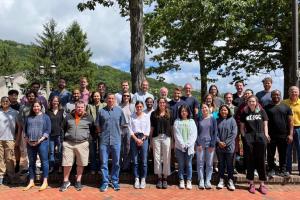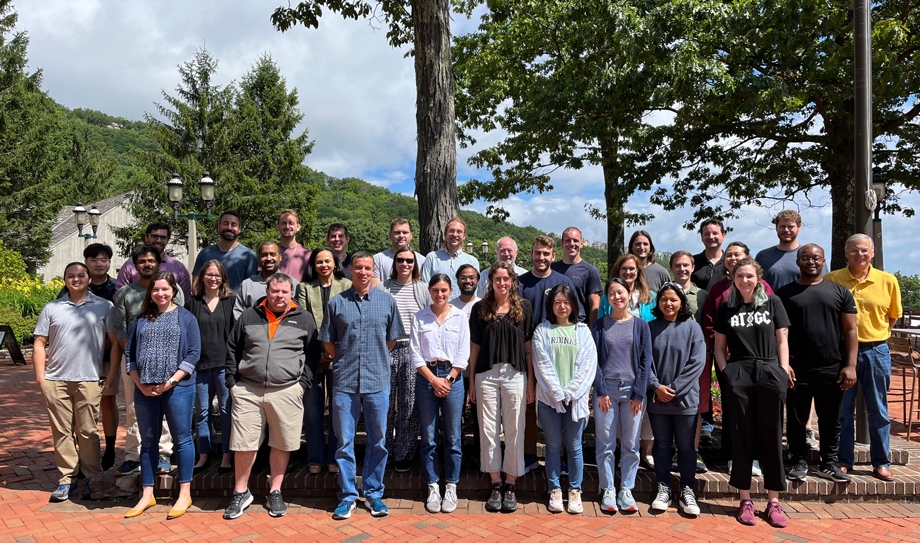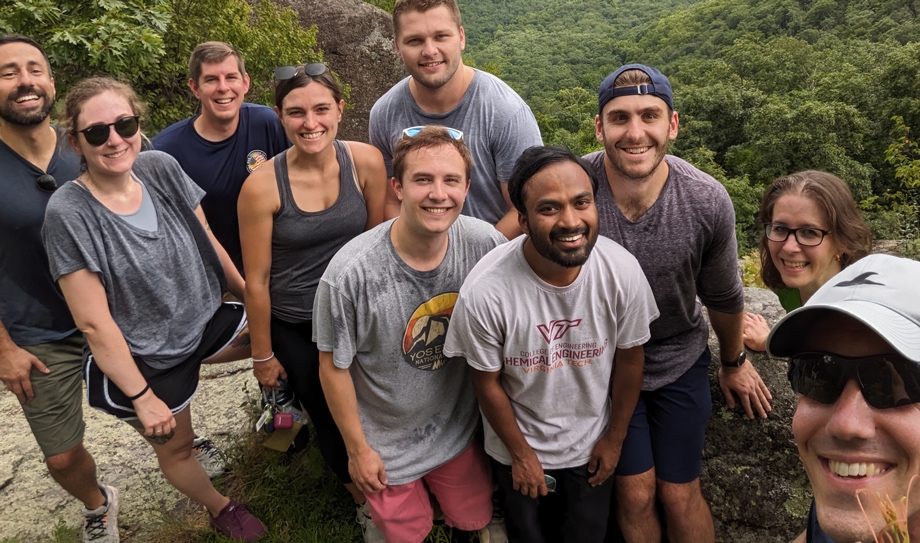
In mid-summer, a few weeks ahead of the new academic year, the faculty of the Department of Chemical Engineering at the University of Virginia came together for a day and a half of discussion, exchanging ideas and fellowship.
There were also some spectacular, if hard-earned, mountain views involved.
Created in the renowned Gordon Research Conference mold, the 2023 CHE Research Retreat was held at Wintergreen Resort, with the afternoon left free for exploring the outdoors and informal discussions. The format was designed to invite questions, feedback and the start of new collaborations.
Fifteen-minute presentations by faculty members highlighted grand challenges in their fields, and their plans to address them. Research topics included developing energy-related catalyst technologies, treatments for debilitating diseases and synthesizing new materials to address climate change and water quality.

In the early evening, Ph.D. students with four or more years of study and postdoctoral researchers presented research posters, generating discussions that continued into an evening reception.
The retreat organizers, led by assistant professor Rachel Letteri and professor Matthew Lazzara, sought a close-knit atmosphere where all attendees could engage as experts in their fields. Inviting experienced Ph.D. students and postdocs allowed for research input and meaningful mentoring across chemical engineering fields and career stages.
“We hope this retreat becomes something that all of our graduate students can look forward to as they enter year five,” said Letteri, whose lab designs polymeric biomaterials for use in health care.
The retreat was the first of its kind for chemical engineering said Ann Warrick Lacy Distinguished Professor and department chair William Epling, at least as far as he knows. It was what he had hoped it would be, he said, thanking the organizers and attendees.
Epling is an integral part of an expanding group of experts focused on addressing climate change through catalysis research within the department and across the university.
“It was pretty interesting to learn what challenges are coming in our different research fields and how we might go about addressing them to answer harder and harder questions,” Epling said. “We also got to see the great work our students and postdocs are doing. And just as important, coming together this way strengthens the collaborative culture we have in our department.”
“Oh, and ask someone about the hike,” he added.
Wait, what? Oh, right — about those hard-won views.
Wintergreen is a ski resort in the Blue Ridge Mountains, about 25 miles south of Charlottesville. Nearly the entire group set off on a roughly mile-long point-to-point trek on a short trail called The Plunge, which connected to a section of the Brimstone Trail.
The ominousness of the nomenclature was not yet apparent to the hikers, to whom the route — which never wandered far from a road — had been recommended as appropriate for the conference attendees.
“The invigorating terrain and rock outcrops afforded fantastic views of the Blue Ridge Mountains,” associate professor Geoffrey Geise said brightly, though he conceded others might offer a contrasting opinion.
The Plunge drops from the trailhead and gets steeper and rockier, while the Brimstone is a “series of steep, short up and down sections,” according to the description.
“I wanted to keep going, but when we came to a rope that you needed to use to get down a section of the Plunge, I started envisioning the headlines of me getting stuck down there,” said the only 8½ months-pregnant member of the party. “I figured the in-laws would be pretty upset.”
Assistant professor Camille Bilodeau and a few others, including her husband, fellow assistant professor Nick Vecchiarello, turned back while the rest of the group climbed on.

Bilodeau knew she chose the prudent path, but it stung a little — even after one or two “It’s a good thing you turned around” comments from the first group of returning trekkers. Then more colleagues made it back.
“I was feeling a little left out until I realized half the group seemed scarred for life,” Bilodeau said. “No one got carried or helicoptered out, but apparently there were a lot more ropes.”
No one was truly scarred, and The Hike is now a bonding memory for the whole group that not even Epling could have scripted — but no more so than the conference itself, Bilodeau said. She joined the department last fall and specializes in applying computational methods, such as machine learning and neural networks, to chemical engineering problems.
“I found myself thinking, ‘Wow, this retreat was really fun,’” she said. “A lot of the reason was the format. Presenters gave short snapshots of their research asking big, broad scientific questions they thought the whole department would understand and could begin to explore.
“There was a lot of mixing ideas and brainstorming. It was a really great opportunity to find out what everyone is doing and also get to know your colleagues. The organizers definitely accomplished what they were trying to do.”